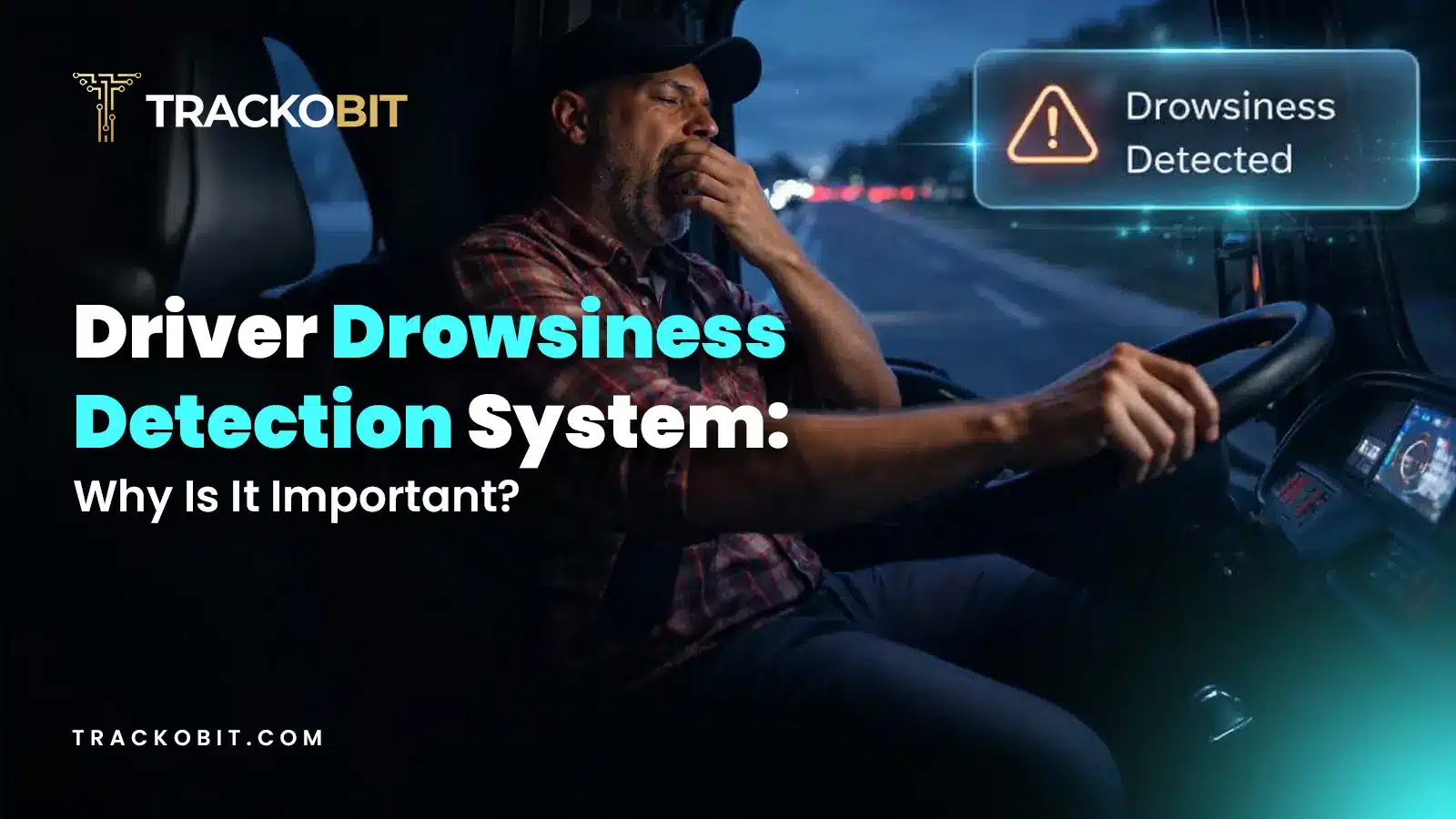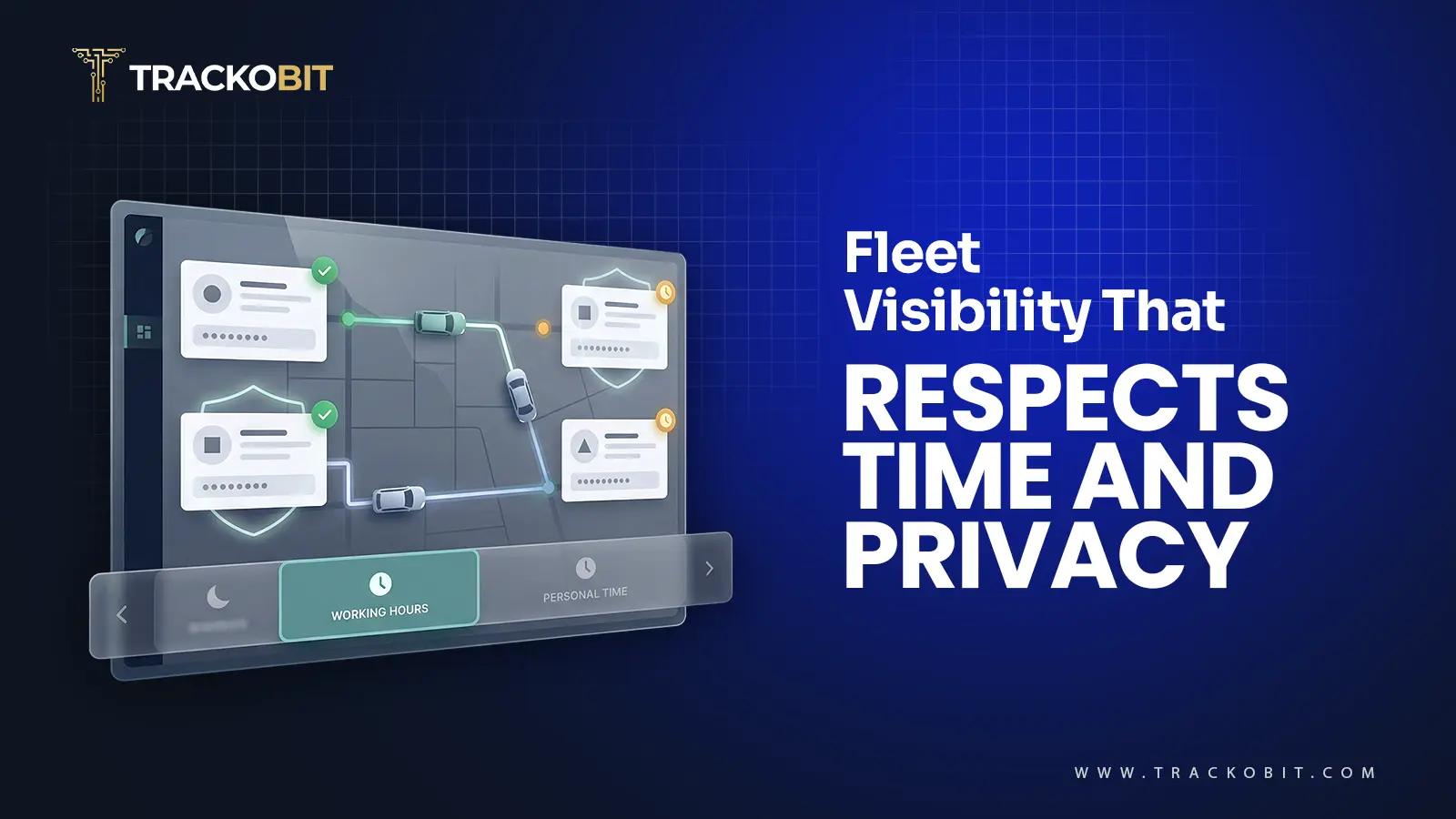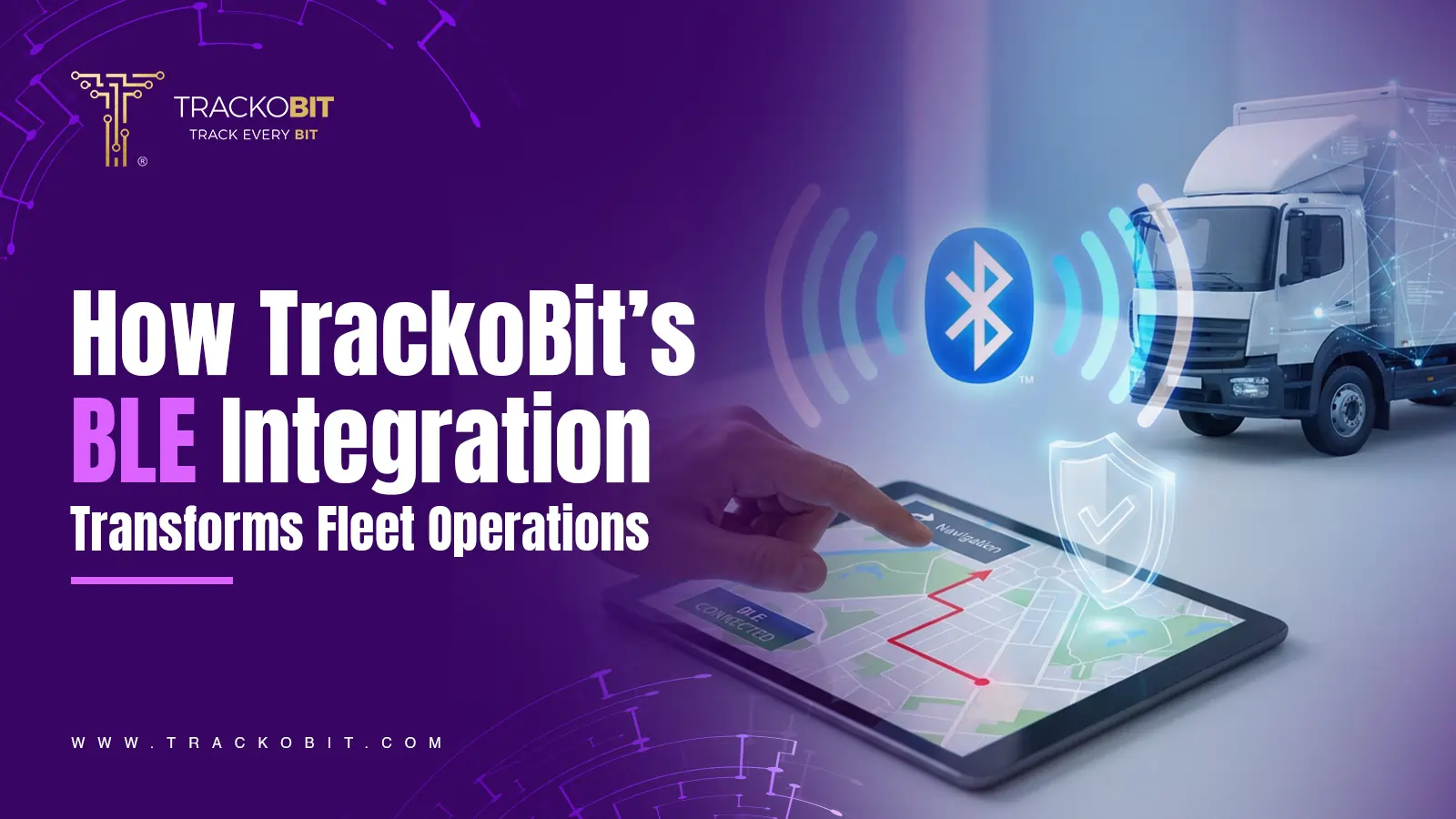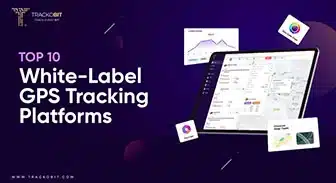-
TrackoBit
Manage commercial vehicles with the new-age Fleet Management Software
TrackoBit -
TrackoField
Streamline your scattered workforce with Field Force Management Software
TrackoField -
Features Resources
-
Blog
Carefully curated articles to update you on industrial trends. -
White Paper
Insightful papers and analysis on essential subject matters. -
Glossary
Explore an alphabetical list of relevant industry terms. -
What’s New
Get TrackoBit & TrackoField monthly updates here. -
Case Study
Explore the cases we solved with our diverse solutions. -
Comparisons
Compare platforms, features, and pricing to find your best fit.
-
About Us
Get to know TrackoBit: our team, ethos, values, and vision. -
Careers
Join the most dynamic cult of coders, creatives and changemakers. -
Tech Support
Learn about our technical support team and services in detail. -
Events
Check out the exhibitions where we left our marks and conquered. -
Contact Us
Connect with us and let us know how we can be of service.
How do Construction Companies Use GPS Tracking Systems?
- Author:Anvesha Pandey
- Read Time:8 min
- Published:
- Last Update: August 12, 2025
Table of Contents
ToggleUnfold how GPS tracking system helps construction industries maximize the visibility and efficiency of multiple equipment, right from towers to earth-moving equipment, service vehicles, and heavy trucks.
Table of Contents
ToggleMost of us are familiar with GPS (Global Positioning Systems) in cars or smartphones. But what if we tell you this technology has a much wider use, especially in the construction industry?
Yes, trust us GPS construction fleet tracking systems are used for everything from tracking vehicles and equipment to enhancing worker safety.
Simply put, you can see where your heavy equipment is in real-time, and track your employees’ working hours to all in all speed up your project delivery. At the same time, you can cut down on operating costs and increase efficiency.
All of this sounds amazing, right? So why waste more time, let’s just cover everything starting from how to use GPS tracking systems along with why to use them with some practical use cases. But, before we get into the details, let’s briefly cover what exactly GPS tracking is.
| GPS Tracking
(meaning) – GPS tracking relies on the Global Positioning System to monitor and track the location, movement, and activities of the assets and vehicles in real time. This further helps in enhancing efficiency, safety, and management capabilities. |
How GPS Tracking Systems Shape the Construction Industry?
![]()
GPS technology is extensively used in the construction industry to enhance efficiency, safety, and productivity across various operations. Below we have mentioned several purposes GPS tracking is used in construction.
1. Vehicles & Equipment Tracking 🚚
Equipment is the main component of any construction industry as these companies heavily invest in excavators, bulldozers, and more. GPS tracking systems can be installed in these vehicles to monitor their precise location in real-time.
This further allows managers to track the movement of equipment across the construction site, ensuring that they are used efficiently and also preventing the unauthorized use of the equipment.
2. Asset Tracking ⚒️
When we talk about the construction industry, vehicle tracking is not enough. In addition to the vehicles, firms also track smaller assets such as ( Tools and materials (using RFID or Bluetooth tags in conjunction with GPSs. This helps in locating misplaced equipment, preventing theft, and ensuring that the right tools are available at the right time, thus further minimizing downtime.
3. Site Monitoring 🚧
GPS tracking software makes it easy to create virtual boundaries or geofences around job sites. When a vehicle or equipment equipped with GPS trackers enters or leaves these boundaries, alerts are sent to the managers’ dashboard. This initiates real-time monitoring of the activities and gives surety that only assigned routes are being navigated and the work is being carried out as planned.
4. Time and Attendance Tracking 📃
GPS tracking systems are used to monitor the time and attendance of workers on the construction sites. By equipping workers with GPS-enabled devices such as smartphones or wearable trackers, managers can accurately track when employees arrive and exit the construction sites. This helps ensure all the labor hours are justified and accounted for and are fairly reimbursed.
Why Use GPS Tracking in the Construction Industry?
![]()
By now, you might be aware that managing efficiency and making the most of your vehicles and workforce can be one of the tasks. Here are more broad reasons explaining how GPS tracking solutions streamline your processes across job sites.
👁️🗨️ Get Real-time Visibility of Your Fleet
GPS tracking systems help in providing real-time locational data of all the equipment (Trucks, trailers, and other vehicles, Generators, and other portable equipment) in your fleet.
This visibility contributes to the better management of resources, monitoring engine hours, idling, and overspeeding allowing managers to track progress and allocate tasks effectively.
Additionally, GPS tracking systems help in better route planning which further contributes to reducing fuel consumption, minimizing vehicle wear and tear, and optimum utilization of time.
🔎 Easily Locate/ Recover Stolen Equipment
Opting for a comprehensive GPS construction fleet tracking system allows you to create virtual boundaries called geofences. So wherever vehicles enter or exit the virtual boundaries, managers receive prompt alerts. Ensuring that the assigned vehicles or equipment are following the safe path.
In addition, these systems are compatible with electronic locks (Elocks) that help ensure the safety of the consignments/ equipment. eLocks lets you mobilize or immobilize assets from any distant location and helps prevent them when risks of theft are on the cusp.
Get real-time updates on your fleet’s whereabouts in real-time with TrackoBit’s asset-tracking software. In addition, the system provides you with a powerful SOS alert that rings if an unlawful event is detected.
⏳ Seamlessly Monitor Engine Hours
Equipment idling is one of the major concerns in the construction industry. Monitoring the engine hours helps in scheduling maintenance and tasks accordingly. By tracking engine hours, construction companies can ensure timely servicing, reducing the risk of unexpected breakdowns and prolonging the lifespan of equipment.
🔊 Get Alerts on Service and Maintenance
GPS tracking systems help generate alerts for scheduled maintenance tasks based on usage patterns or predefined intervals. These alerts ensure that maintenance is performed proactively, preventing costly repairs and downtime.
More Broad Use Cases of GPS Tracking for Your Construction Business
Here are more ways how GPS tracking can help get the most out of your construction business. Let’s look at some of the practical ways that you can leverage the software to simplify your daily construction operations.
✅ Visibility During On-road Materials or Assets Transportation
You must be using a variety of vehicles to load or move construction materials… right? Time plays a pivotal role in the delivery of the materials. As a result, tracking of movement of industrial goods via road also becomes important.
Additionally, GPS systems not only help with locational supervision but also help you share ETAs and collect PODs. This helps in letting you know the arrival of the materials and marking that you received the materials. This maintains transparency and ensures the safe arrival of assets.
Real-time tracking of the materials and efficient route planning is where GPS tracking solutions come into the game. What’s more that comes along is a detailed insight into the engine hours and fuel consumption. This further helps in having an analysis of how much fuel a vehicle needs and the maintenance status of the engine.
✅ Wearable GPS Device for Field Workers’ Productivity Assessment
Not just your vehicle, GPS tracking systems are also helpful in monitoring the whereabouts of your field workers.
Your construction workers can wear wearable GPS-tracking devices, and these devices will help you stream real-time data on your workforce activities around the job site. Basically, it enables you to track their general whereabouts so that you can better judge their operational productivity and performance.
Using GPS trackers positively affects the progress of your construction workforce and ultimately impacts your company’s bottom line.
To get the maximum value out of your field workers, you can leverage TrackoField’s field employee tracking software. It will not just help you get their locational visibility but also help manage their tasks, shifts, and payroll data.
| 🔦Fact Time- Items such as trucks, power tools, and other essential on-site equipment are excellent targets for theft. A recent survey shows construction-related crime has increased by 35 percent over the past year, roughly 13 incidents per day.
The cost of tools and equipment stolen from construction sites and tradespeople’s vehicles topped USD 8.4 million last year. Out of that, equipment stolen from vehicles amounted to half of that figure. This shows how vital GPS tracking is to help capture data, including location, usage, engine hours, idle time, and on-site job time. |
Importance of GPS Tracking in the Construction Industry
Now you know the various purposes of GPS tracking in the construction industry. Let’s rummage around the deep-rooted benefits of incorporating GPS into your construction business.
🚜Enhanced Asset Management
GPS tracking enables real-time monitoring of the vehicles and equipment used in the construction industry, providing comprehensive insights into the whereabouts, usage, and operational status of the vehicle. Using GPS tracking construction companies can pinpoint the exact location of assets and further prevent theft.
All together this helps in safeguarding valuable investments and maximizing efficiency.
📈 Optimal Resource Allocation
Construction projects entail a multitude of resources. From raw materials to manpower, everything requires meticulous oversight to ensure optimal allocation and transfer across job sites. GPS asset tracking facilitates seamless coordination by providing real-time visibility into the availability of resources, usage patterns, and logistical needs.
This data-driven approach enables fleet managers or construction managers to streamline workflows, minimize downtime, and allocate resources easily.
All together this helps in enhancing project efficiency and profitability.
👁️Better Project Oversight
GPS tracking systems empower fleet managers or construction managers with unparalleled visibility into the progress of the ongoing project. This enables them to monitor operations remotely and make informed decisions in real time.
By tracking the movement of equipment, materials, and personnel managers can identify bottlenecks, anticipate delays, and proactively address challenges and issues that might escalate in the future.
Altogether tracking systems help in optimizing project timelines and ensuring successful project deliveries.
🚧Enhanced Compliance and Reporting
Regulatory compliance is one of the most critical aspects of construction operations, encompassing various requirements related to safety, environmental regulations as well as workforce management.
GPS tracking system facilitates compliance by providing accurate data on vehicle usage, driver behavior, and adherence to regulatory guidelines. This data can be leveraged to generate comprehensive reports, streamline audit processes, and demonstrate compliance with regulatory authorities.
Overall, by harnessing the power of GPS tracking, construction companies can achieve unprecedented levels of efficiency, safety, and transparency, paving the way for success in an increasingly competitive industry landscape.
📌 Also Read- 7 Key Benefits of GPS Tracking System
Final Words
Now that we are all set to finish this piece of writing, by now, you must have understood that the GPS tracking system is an all-rounder. GPS tracking systems are like high-tech assistants for construction companies. They help keep an eye on everything from vehicles to tools, making operations smarter, safer, and more efficient.
The solution provides not just one but various reasons why you should integrate a GPS-tracking system into your business. It can help you seek real-time visibility of both your vehicles and workforce, locate your lost equipment, look into the engine hours, identify the reasons for delayed processes, and much more.
Moreover, the solution holds great importance in the construction industry as it enhances asset management, helps in better allocation of resources, and ensures no asset is lying under or over-utilised.
Time To Cement Precision, Efficiency, and Safety on Your Job Site ⏳
Stay on track with precision!
Experience seamless construction assets and site management with TrackoBit GPS tracking solutions. Take control of your projects, optimize efficiency, and ensure end-to-end safety. With our 99.9% accurate solutions, know exactly where your construction vehicles or equipment are operating.
Still waiting?
Frequently Asked Questions
-
What is Geofence?
A Geo-fence is a virtual boundary or perimeter for a real-world geographic area. In the context of a GPS tracker for construction equipment, it’s a feature that allows you to establish designated areas for your equipment. When your equipment enters or leaves these predefined zones, the tracker triggers an alert.
This is especially important for safety and efficiency, allowing you to more closely monitor the movement of your assets and ensure they operate within their expected locations. This function is crucial for preventing unauthorized use or theft of your valuable assets. -
What types of construction assets can be tracked using GPS?
GPS tracking can be applied to various assets in construction, including:
1. Heavy machinery (excavators, bulldozers, cranes, etc.)
2. Trucks, trailers, and other vehicles
3. Generators and other portable equipment
4. Tools and materials (using RFID or Bluetooth tags in conjunction with GPS
-
How does GPS tracking work in construction?
GPS tracking devices installed on construction equipment or vehicles use signals from satellites to determine their precise location. This information is then transmitted to a central server where it can be accessed and analyzed by project managers or stakeholders.
-
What are the costs associated with GPS tracking for construction?
Costs vary depending on factors such as the number of assets to be tracked, the features and capabilities of the tracking system, and any subscription fees for accessing the monitoring platform.
However, the potential savings in fuel, labor, and equipment maintenance costs often justify the investment in GPS-tracking technology
Anvesha is a communication specialist at TrackoBit. With a strong background in media and communications, she adds much-needed balance and brevity to TrackoBit’s... Read More
Related Blogs
-

Why is Driver Drowsiness Detection System Important for Fleet Management?
Shemanti Ghosh February 4, 2026A driver drowsiness detection system is critical for fleet management. It helps prevent fatigue-related accidents and reduces operational risks through…
-

When Tracking Needs a Clock: Rethinking Fleet Visibility
Tithi Agarwal December 24, 2025Read on to understand why fleet tracking works better when it follows working hours. Because visibility should support operations, not…
-

What Makes TrackoBit’s Video Telematics Software Truly Next-Gen?
Shemanti Ghosh December 17, 2025TrackoBit’s video telematics software blends smart video intelligence with full server control. The result? Superior fleet reliability and safety.
-

Plug, Pair, Perform TrackoBit Introduces BLE Sensor Integration
Tithi Agarwal November 26, 2025TrackoBit’s BLE Sensor Integration enables wireless, real-time monitoring with faster installs and accurate insights. It improves fleet efficiency, visibility, and…

Subscribe for weekly tips to optimize your fleet’s potential!
Your inbox awaits a welcome email. Stay tuned for the latest blog updates & expert insights.
"While you're here, dive into some more reads or grab quick bites from our social platforms!"Stay Updated on tech, telematics and mobility. Don't miss out on the latest in the industry.
We use cookies to enhance and personalize your browsing experience. By continuing to use our website, you agree to our Privacy Policy.





































